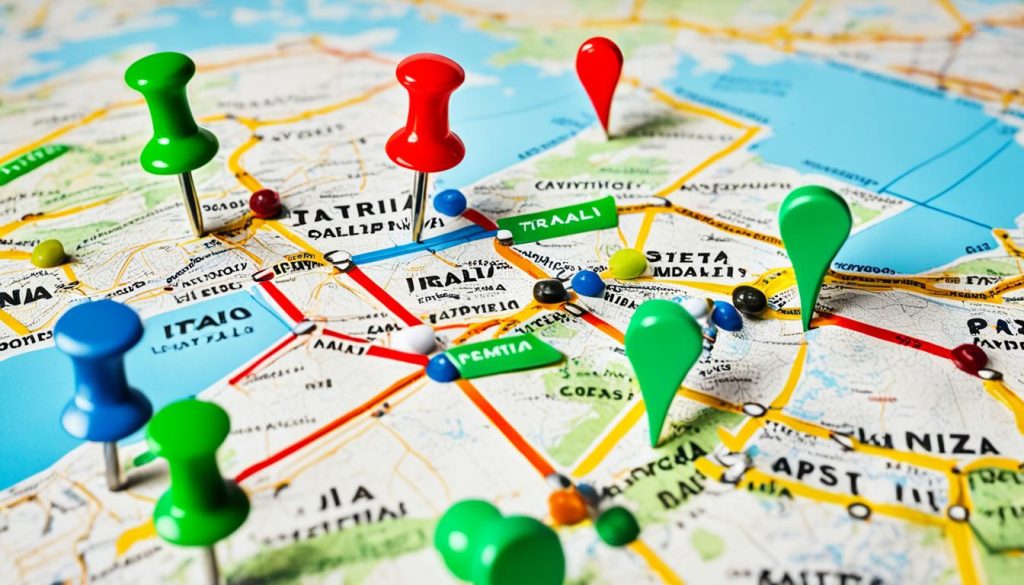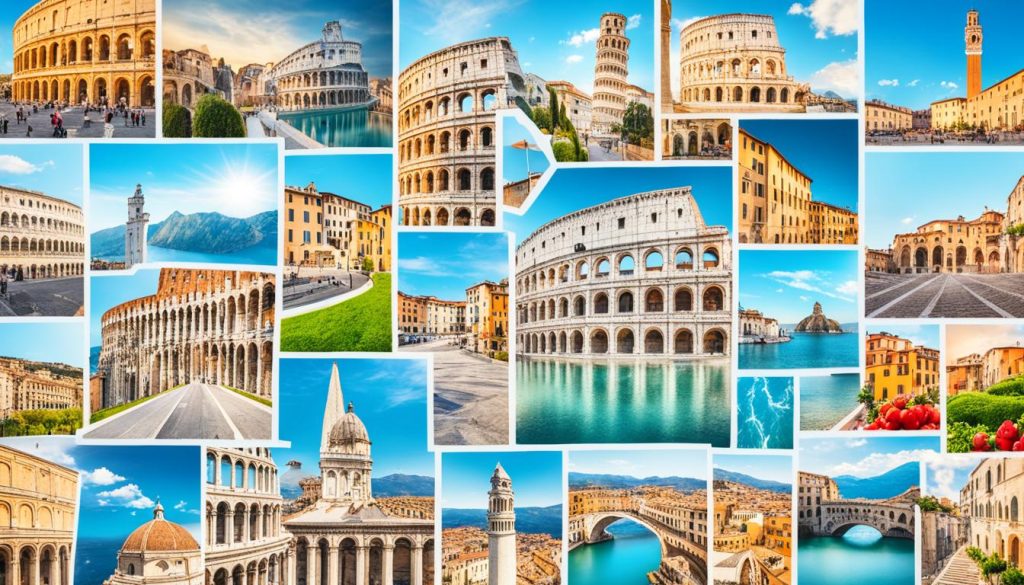Starting a travel business in Italy is a great chance in a booming industry. Italy’s travel market is growing fast, thanks to many tourists wanting to see its culture, beautiful views, and food. To do well, you need a good plan, to know the market well, and follow the rules. This article will cover important tips, chances, and stats on starting a travel business in Italy.
Key Takeaways
- Identify trends driving the Italian travel market.
- Understand the importance of niche specialisation.
- Ensure compliance with regulations and permits.
- Cultivate a unique selling proposition for your business.
- Utilise digital tools for effective marketing strategies.
- Prioritise customer service excellence to enhance your reputation.
Understanding the Italian Travel Market
The Italian travel market is a lively sector, shaped by changing trends and consumer tastes. A deep dive into the market shows us what drives tourism in Italy. This knowledge helps new businesses find their spot in this lively market.
Current Trends in Italian Tourism
Nowadays, travellers want real experiences, leaning towards cultural and eco-tourism. Places like Florence and the Amalfi Coast draw in millions yearly with their history and stunning views. Here are some key trends in Italian tourism:
- Cultural Immersion: People now prefer deep cultural experiences, like local cooking classes and historical tours.
- Sustainable Travel: More travellers are looking for eco-friendly places to stay and travel options, showing a global move towards sustainability.
- Digital Experiences: Virtual tours and online activities are becoming more popular, especially after the pandemic.
- Health and Wellness: There’s a big interest in wellness-focused trips, including spa retreats and nature-based activities.
ENIT’s market analysis highlights the big growth potential for businesses that meet these changing consumer needs. By matching their offerings with what travellers want, companies can really benefit from these trends.
| Tourism Trend | Key Highlights | Target Audience |
|---|---|---|
| Cultural Immersion | Local experiences, cooking classes, historical tours. | Millennials, Gen Z, cultural enthusiasts. |
| Sustainable Travel | Eco-friendly lodging, responsible travel practices. | Environmentally conscious travellers. |
| Digital Experiences | Virtual tours, online cultural engagements. | Tech-savvy audiences, remote customers. |
| Health and Wellness | Wellness retreats, outdoor adventures. | Health-focused travellers, retirees. |
For any business owner looking to enter the Italian travel market, it’s crucial to understand its trends. Knowing what travellers want today helps in creating offerings that meet their needs.
Identifying Your Niche in the Travel Sector
In the travel industry, finding your own Travel Niche is key to success. Entrepreneurs should look at different travel areas. They should see how Specialised Travel can draw in specific customers.
Think about focusing on niches such as:
- Luxury Travel: For wealthy clients wanting unique experiences in beautiful places.
- Adventure Tourism: For those who love outdoor activities and exciting adventures.
- Culinary Tours: For food lovers who want to dive into local flavours.
Doing thorough market research is vital. It helps understand what customers want and spot market gaps. This can lead to standing out in the market with your Travel Services.
Looking at successful businesses shows how targeting niches can lead to growth. For instance, a company focusing on eco-tourism attracts those who care about the planet. It also joins a growing trend in sustainable tourism. By matching personal interests with market needs, entrepreneurs can make a strong connection with their audience.
Travel Business in Italy: Key Regulations and Permits

Starting a travel business in Italy means understanding many rules and permits. The Italian government has rules for travel agencies and similar businesses. It’s important to know these rules to follow the law.
Getting the right Business Permits is key for business owners. You get these from local authorities and the Italian Chamber of Commerce. Each area has its own rules, so it’s vital to check these out.
There are also Legal Requirements to meet. You need to register with tax agencies and follow health and safety laws. Don’t forget about consumer protection laws, as they help keep customers happy and protect your business.
Travel Licences are a must for tour and activity businesses. The licence you need depends on your services. Knowing what licence you need helps you run your business legally and well.
Following data protection laws, like the GDPR, is also crucial. This means keeping customer data safe and open about how it’s used.
To show the main permits and requirements, here’s a table:
| Permit/Requirement | Description | Authority |
|---|---|---|
| Travel Licence | Required for tour operators and agencies | Ministry of Cultural Heritage and Activities |
| Business Permit | Local registration for business operation | Local municipality |
| Consumer Protection Compliance | Adherence to laws ensuring customer rights | Italian Competition Authority |
| GDPR Compliance | Regulation on data protection and privacy | European Union |
Crafting a Unique Selling Proposition
A Unique Selling Proposition, or USP, is key to standing out in the travel market. It shows what makes your brand special. Knowing and sharing your USP helps your brand stand out in Italy’s travel industry.
To make a strong USP, look closely at your competitors and know your customers well. Do market research to find what’s missing that you could fill. Think about what unique experiences or services you offer that others don’t.
Look at successful USPs in travel for inspiration. For example, Cook Islands Tourism focuses on showing the hidden side of travel, giving a close look at local culture. Companies that focus on eco-friendly travel appeal to those who care about the planet.
In short, having a unique selling proposition is crucial for making your brand stand out. By understanding the market and what your customers want, you can make a USP that draws people in.
Building a Strong Brand Identity
Creating a strong Brand Identity is key for travel businesses. It includes logo design, colour schemes, and brand voice. These elements must share the business’s core and connect with the audience.
A good logo is the brand’s face, making it instantly recognisable and trustworthy. The right colours can change how customers see the brand. For example, bright colours might show energy and adventure, while soft colours suggest sophistication and peace.
Branding Strategies are vital for keeping a consistent look across all marketing. This makes customers feel at home with the brand, which builds loyalty. Every interaction, from social media to customer service, should show the brand’s true self.
Let’s look at how each part of Travel Business Branding matters, using the table below:
| Brand Identity Element | Description | Impact on Brand Recognition |
|---|---|---|
| Logo Design | Visual representation of the brand | Quick customer identification |
| Colour Schemes | Create emotional connections | Consistent user experience |
| Brand Voice | Communication style and tone | Enhances relatability and trust |
| Marketing Materials | Brochures, websites, and social media | Builds a cohesive brand presence |
Being consistent with these elements makes a travel business stand out in Italy. It affects customer choices and experiences.
Developing a Comprehensive Business Plan

A solid Business Plan is key for a travel business’s success. It lays out the strategy, vision, and how things will work. It helps guide the business towards its goals. Key parts include looking into the Travel Business Strategy. This should cover what makes the company stand out, who it aims to serve, and what it offers.
Starting with a SWOT analysis is crucial for a strong Business Model. This analysis spots Strengths, Weaknesses, Opportunities, and Threats in the market. Knowing these can help make important decisions and steer the business towards success.
Financial Planning is vital in the early stages. It’s about setting realistic financial goals to track progress and manage costs. This means figuring out startup costs, predicting income, and planning for financial challenges.
Marketing strategies need to be clear in the Business Plan. A smart way to reach customers can greatly improve the business. This could be through new marketing, social media, or working with local businesses.
Looking at successful travel companies shows how important careful planning is. Lastminute.com and Expedia have done well thanks to detailed Business Plans. These plans helped them adjust to market changes.
| Component | Description | Importance |
|---|---|---|
| SWOT Analysis | Identification of strengths, weaknesses, opportunities, and threats | Guides strategic decision-making |
| Financial Planning | Projection of revenues and expenses, budgeting | Ensures financial viability |
| Marketing Strategy | Approach to reaching prospective customers | Increases visibility and sales |
| Business Model | Framework for creating, delivering, and capturing value | Central to operational success |
Marketing Strategies for Your Travel Business
For any travel business in Italy, effective marketing strategies are key. Using both digital and traditional methods helps boost brand awareness and engage customers. Content marketing is vital, creating valuable content that draws in potential travellers. This includes blog posts about Italy, travel tips, or cultural insights.
Email marketing is a strong way to talk directly to customers. It lets businesses send special offers to past customers and new leads. Sending regular newsletters keeps your audience updated on new services, deals, and travel trends. This helps build customer loyalty.
SEO is important for making your travel ads stand out online. It means making your website easy to find by search engines, using the right keywords, and improving the user experience. This makes your site more visible and brings in more visitors.
Working with local tourism boards and businesses can boost your marketing. These partnerships can lead to joint ad campaigns that save money and reach more people. Successful travel marketing campaigns show how these partnerships can work. For example, teaming up with well-known tourism boards can greatly improve your brand’s trust and visibility.
| Marketing Strategy | Description | Benefits |
|---|---|---|
| Content Marketing | Create valuable, relevant content to attract and engage potential customers. | Increases website traffic, establishes authority in the market. |
| Email Marketing | Direct communication with potential and previous customers through newsletters. | Builds customer loyalty and drives repeat business. |
| SEO Optimisation | Enhancing website content for better visibility on search engines. | Attracts organic traffic, improves online presence. |
| Partnerships | Collaborating with local businesses and tourism boards for joint initiatives. | Extends reach and reduces marketing costs. |
Establishing Partnerships and Collaborations
Creating strong Business Partnerships is key to doing well in the travel industry. Working with local hotels, transport services, and tourism boards can make your services better. These partnerships help everyone grow and allow for joint marketing, which boosts visibility a lot.
Networking is very important for making good partnerships. Talking to local people helps find potential partners who fit with your goals. Building strong relationships takes time and effort, but the benefits are huge.
When looking for Travel Collaborations, clear talking is crucial. Both sides need to discuss what they expect, who they want to reach, and what they can offer. Agreeing on terms that help both sides is important. It’s key to make agreements official to be clear and committed.
Successful Travel Alliances show how working together can be powerful. Big travel companies often team up with local sights to offer special deals. These partnerships make customers happier and give financial benefits through combined services.
| Type of Collaboration | Benefits | Examples |
|---|---|---|
| Hotel Partnerships | Enhanced accommodation options | Co-branded packages with local hotels |
| Transport Services | Seamless travel experience | Combinations with local transport companies |
| Tourism Boards | Access to promotional resources | Joint marketing campaigns |
Utilising Digital Tools and Technology
In today’s world, using Travel Technology is key to success. Digital Tools make things run smoother and improve how customers feel. A strong Online Booking System lets customers book easily anytime. This cuts down on work for businesses, letting them improve their services.
Travel Software helps talk better with clients. CRM (Customer Relationship Management) software shows what customers like and do. This info helps make marketing that speaks to them.
A website that works well on mobile makes getting info easy. A good website also helps you show up in searches, bringing in new customers. Using Google Ads and TripAdvisor makes your travel options more visible to people looking for them.
Here’s a table showing important Digital Tools for travel businesses:
| Digital Tool | Primary Function | Benefits |
|---|---|---|
| Online Booking Systems | Reservation Management | 24/7 access, reduced manual errors, easy updates |
| CRM Software | Customer Relationship Management | Personalised communication, enhanced client retention |
| Data Analytics Tools | Behaviour Analysis | Understanding trends, informed decision-making |
| Search Engine Optimisation Tools | Website Visibility Improvement | Increased traffic, better targeting |
Customer Service Excellence in the Travel Industry
In the travel industry, great customer service is key. It makes a big difference to how happy a client feels during their trip. This leads to more satisfied customers and more business coming back.
Travel professionals know that excellent service is crucial for keeping customers coming back.
To give top-notch customer service, companies should follow these steps:
- Personalisation: Tailoring services to what each client likes makes them feel valued and improves their trip.
- Proactive Communication: Keeping clients updated helps avoid any confusion and makes them happier.
- Efficient Complaint Resolution: Quickly fixing customer problems not only solves issues but also builds trust.
- Employee Training: Training staff well gives them the skills to always provide excellent service.
Looking at top companies shows us what works well. For example, Ritz-Carlton trains its staff to guess what guests need and give them special experiences. This makes guests very happy and they tell others about it.
Using these strategies every day keeps the focus on the customer. This makes the travel experience better and helps businesses grow.
Pricing Strategies for Maximum Profitability
Effective Pricing Strategies are key to a travel business’s success. They help in making the most profit. It’s important to know different pricing models to stay competitive. Prices change with the seasons, so setting the right prices can boost profits.
Cost-plus pricing is a common method. It means adding a markup to total costs. This way, all expenses are covered, and there’s still a profit. Penetration pricing is good for new businesses. They set low prices to draw customers away from rivals.
Dynamic pricing is a new and clever way to set prices. It changes based on demand, what others charge, and more. For example, prices go up in the busy season and down when it’s quiet to get more bookings.
It’s important to look at what competitors charge. This helps in setting prices that stand out. Knowing who your customers are also helps in setting prices they’ll like. This makes them more likely to buy.
| Pricing Strategy | Description | Advantages |
|---|---|---|
| Cost-Plus Pricing | Calculating total costs and adding a markup. | Ensures all costs are covered; straightforward to implement. |
| Penetration Pricing | Setting lower prices to attract new customers. | Quick market entry; increases customer base rapidly. |
| Dynamic Pricing | Adjusting prices based on market demand. | Maximises revenue opportunities; flexible. |
Leveraging Social Media for Travel Promotion

In today’s world, using social media for travel promotion is key. Billions of people use platforms like Instagram, Facebook, and Pinterest. These platforms offer a great chance to connect with potential customers. A strong social media plan can make your travel business more visible and draw in people looking for new travel experiences.
It’s important to pick the right platforms for your promotion. Instagram is great for showing off beautiful places with its focus on visuals. Facebook is good for building a community and sharing more detailed content. Pinterest is like a virtual inspiration board, where people find and save travel ideas, often linking directly to booking pages or blogs.
To really connect with people, your content needs to stand out. Here are some tips:
- High-Quality Visuals: Use professional photos and videos to show off the beauty of places.
- Storytelling: Share your own travel stories or those of your customers to build a connection.
- User-Generated Content: Ask your followers to share their travel stories and re-share their posts.
- Interactive Posts: Use polls, questions, or quizzes to get people talking online.
Successful social media campaigns have really boosted brand awareness and engagement. Here are some examples:
| Campaign Name | Platform | Engagement Increase |
|---|---|---|
| Explore Italy | 150% | |
| Wanderlust Fridays | 120% | |
| Pin Your Next Adventure | 90% |
Adding these elements to your social media plan can really get people interested and lead to more bookings. For travel businesses, using social media as a key part of your marketing can bring big rewards.
Understanding Taxation and Financial Management
Managing Travel Business Finances in Italy means knowing the Taxation Italy rules well. Business owners must understand income tax, value-added tax (VAT), and other taxes specific to tourism.
Income tax rates vary with the business’s earnings. Keeping precise Accounting records is key for following the law and managing finances well. It’s wise to hire an accountant who knows Italian tax laws, especially for travel businesses.
Registering for VAT is needed if your business makes over a certain amount each year. Knowing how VAT affects prices can help your business stand out in the travel market. Also, correctly issuing receipts and documenting sales is important to avoid mistakes.
For better finance management, consider hiring a financial advisor with travel industry knowledge. They can offer specific advice for planning and following the rules. With good Financial Management, travel businesses in Italy can handle taxes well and succeed.
| Aspect | Description | Importance |
|---|---|---|
| Income Tax | Tax on earnings generated by the business. | Essential for determining profitability. |
| VAT Registration | Required once turnover exceeds a specific limit. | Critical for pricing strategy and compliance. |
| Accounting Practices | Regular maintaining of financial records. | Facilitates financial analysis and tax compliance. |
| Financial Advisor | An expert providing advice tailored to travel businesses. | Helps maximise profitability and ensure compliance. |
Staying Updated with Travel Trends and Regulations
In the fast-changing world of travel, it’s crucial to keep up with new Travel Trends and Industry Regulations. By regularly checking the market, businesses can quickly adjust to what consumers want and to new rules. Here are some ways to stay informed:
- Attend relevant industry conferences to network and gather insights directly from experts.
- Subscribe to reputable travel news outlets for the latest developments in travel regulations and market dynamics.
- Join professional associations that provide resources, conferences, and publications focused on the travel sector.
Using these methods helps businesses get important Travel Insights. This can lead to growth and keeping up with the law. By connecting with well-known groups and resources, business owners get the info they need to move forward in a changing world.
Networking within the Italian Travel Community
Networking in the Italian travel community is key for growing your business and working together. It opens doors to new opportunities, like learning about market trends and finding partners for projects. Being part of this community helps you stand out and find new ways to grow your travel business.
It’s important to take part in events, workshops, and online forums to network. Events like the Italian Travel Awards or the Tourism Innovation Summit are great for sharing ideas and making connections. These events can lead to new projects and partnerships that help your business grow.
Joining business groups and travel clubs also has big benefits for your career. These groups offer chances to share knowledge, get updates on the industry, and learn best practices. Being part of a strong network in the travel community helps you move forward in your career and supports the industry’s growth.
FAQ
What are the key steps to starting a travel business in Italy?
Starting a travel business in Italy means doing market research, finding your niche, and understanding the legal stuff. You also need a good business plan and strong marketing. Knowing what locals like is key to success.
How can I identify the right niche for my travel business?
Find the right niche by looking at trends and what customers want. Think about luxury travel, adventure, or food tours to stand out. This helps you be different from others.
What legal requirements should I be aware of when starting a travel business in Italy?
You need business permits and licenses, and follow health and safety laws. Consumer protection laws are also important. A legal expert can help you with these rules.
How important is a Unique Selling Proposition (USP) for my travel business?
A strong USP is key to stand out in the travel market. It shows what makes your service special and draws in the right customers. This boosts your brand and keeps customers coming back.
What marketing strategies work best for a travel business?
Good marketing includes content, social media, emails, and ads. Being strong online with SEO and talking to your audience helps a lot. This makes people more aware of your brand and more likely to book with you.
How can I build a strong brand identity in the travel sector?
For a strong brand, use consistent visuals and a voice that speaks to your audience. Keep this look and feel across all your marketing and customer talks. This makes a big impact and helps people remember you.
What are the benefits of establishing partnerships in the travel industry?
Partnerships can make your services better and reach more people. Working with hotels and guides can give you a full travel package. This draws in more customers.
Why is customer service important in the travel industry?
Great customer service makes people happy, keeps them coming back, and builds your reputation. Being personal and quick to solve problems gets you good reviews. This is gold in the travel world.
How can technology aid in managing my travel business?
Using travel tech like booking systems and CRM tools makes things easier. It helps with customer service and makes your business run smoother. These tools are a must in today’s digital world.
What are the key considerations for pricing strategies in a travel business?
Think about what people want, who they are, and how you price things. Using smart pricing like cost-plus or dynamic pricing can help. This strategy can bring in more customers and make more money.
How often should I update my knowledge on travel trends and regulations?
Keep up with travel trends and rules by going to events, reading news, and talking to others in the industry. This keeps you ready for changes that could affect your business.
What are effective ways to network within the Italian travel community?
Join networks, go to workshops, and talk online to make connections. Being part of groups and clubs gives you insights and helps you grow professionally in the Italian travel world.









